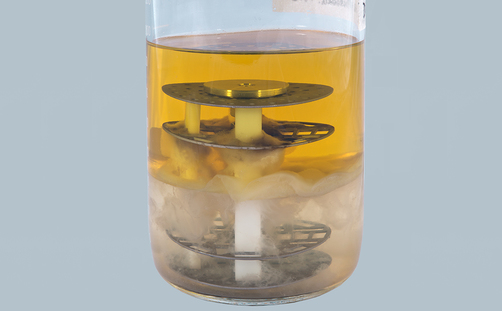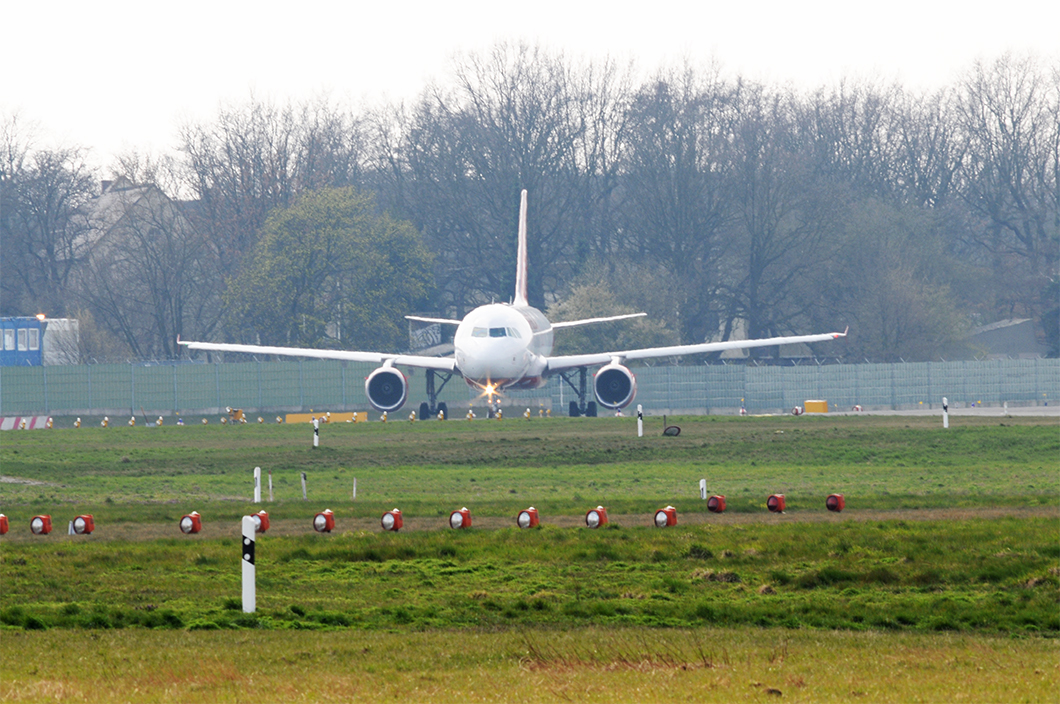
Laboratory flask containing water, microbes and diesel
Source: BAM
Project period
10/05/2018 - 30/04/2020
Project type
Interdisciplinary project
Project status
Closed
Description
Fuels like kerosene can be contaminated and degraded by microorganisms. Biological contamination of fuels is a particular problem in aviation. BioDetector is a research and development project which will develop an integrated system for the DNA-based detection of biological contaminants in fuels.
Location
Bundesanstalt für Materialforschung und -prüfung
Unter den Eichen 87
12205 Berlin
Fuels like kerosene must be free of contamination Source: BAM
Fuels like diesel or kerosene can be contaminated and degraded by microorganisms like fungi and bacteria. Bacteria and fungi that clog fuel lines and filters can cause motor and engine failure. Fast and reliable on-site methods for the detection of microorganisms in kerosene and diesel, e.g. at the aircraft itself, are not yet available. The BioDetector project intends to develop a rapid test.
Source: BAM
The microorganisms in fuel are detected by their DNA content. The method used for detection is isothermal amplification, which is a reliable way of amplifying DNA even in fluctuating temperatures. The process of sample preparation and amplification will be miniaturised, integrated in a system-based solution and combined with a detection module. The planned detection device will be mobile and easy to use and will deliver reliable results even in extreme conditions.
Source: BAM
Source: BAM
BAM cooperation partners
M2 Automation
Fraunhofer Institut IZI-BB
Funding
This project is funded by the European Regional Development Fund and the State of Berlin.
Funding scheme: Pro FIT No. 10163726
BioDetector – mobile system for the rapid local detection of biological contamination in fuels
The biological contamination of fuels is a major issue in all areas where large quantities of fuels are required or stored for a relatively long time, e.g. in the transportation sector (freight transport, passenger transport and aviation) but also in the leisure industry (boat engines) and in agriculture (tractors and diesel tanks). The risk of lines being clogged by bacteria or germs is very high and leads to the failure of engines and turbines. Many different bacteria, germs and microbes are known to cause contamination and degradation of fuels.
Fuel containers are therefore required to undergo regular inspections. Contamination problems must be detected at an early stage in order to avert potential damage. The current detection methods are not specific enough, however, failing to detect all the organisms present, and they take too long or cannot be used in situ. The BioDetector project has taken up the challenge of developing a robust mobile detection system which will detect the quantity of microorganisms in fuels on the ground within 30 minutes.
Methods
Signs of contamination are detected through the analysis of DNA. The remit of the project is to coordinate and optimise the individual steps of the process, from sample extraction, DNA isolation and amplification right through to analysis and evaluation and integration in a self-contained system. BioDetector combines sensitivity and speed for an on-site assay (rapid test) and can detect the inevitable broad spectrum of critical contaminating organisms which might be present. In contrast to the detection methods used in practice until now, the new method developed by the BioDetector partners is faster and more sensitive, and it can detect the full range of biological contaminants potentially occurring in the fuel.
The detection system is being developed as an integrated process which will be integrated in an automated rapid on-site test system after successful validation. The aim is to achieve a system which involves a minimum amount of user input so as to preclude errors in handling and operation as far as possible. The actual process of detecting the microbial DNA in fuels is carried out through amplification of DNA. The amplification of DNA is based on isothermal amplification, a process which is similar to classic polymerase chain reaction (PCR) but which is carried out at constant low temperatures and is more reliable and faster at detecting DNA than PCR.
Funding
Logo of the EU European Regional Development Fund Source: EU 


